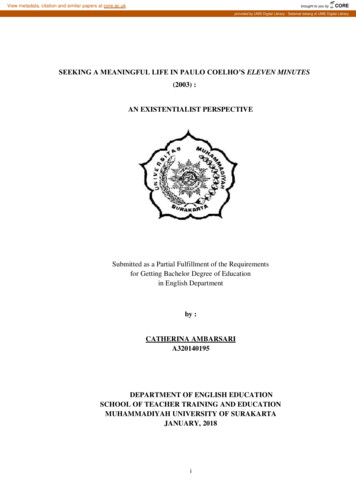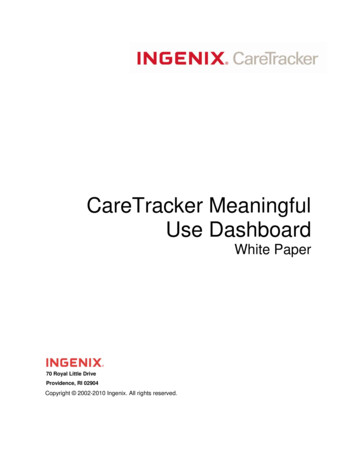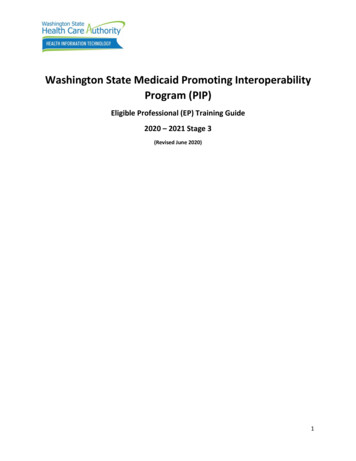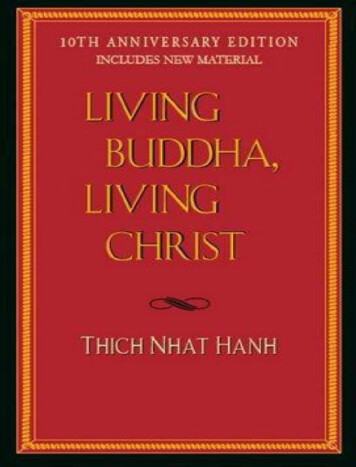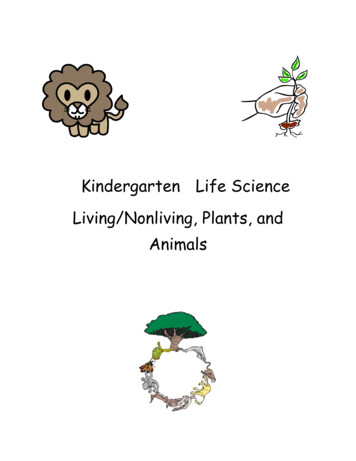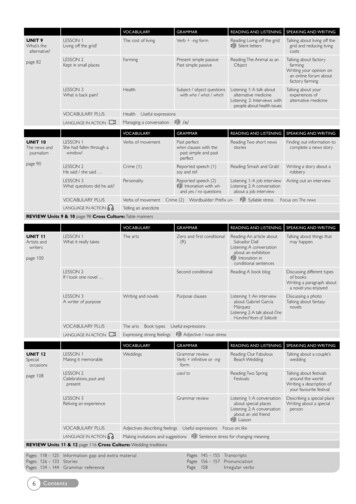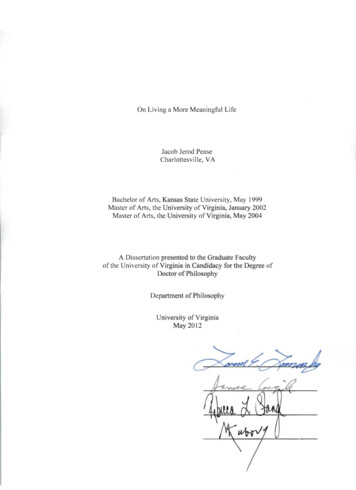
Transcription
On Living a More Meaningful LifeJacob Jerod PeaseCharlottesville, VABachelor of Arts, Kansas State University, May 1999Master of Arts, the University of Virginia, January 2002Master of Arts, the University of Virginia, May 2004A Dissertation presented to the Graduate Facultyof the University of Virginia in Candidacy for the Degree ofDoctor of PhilosophyDepartment of PhilosophyUniversity of VirginiaMay 2012
iAbstractIn this dissertation, I differentiate between the philosophical questions of “What isthe meaning of life?” and “What is involved in coming to live a more meaningful life?”;the aim of the dissertation is to provide an answer to the latter, but not the former,question. Previous attempts to distinguish between more and less meaningful lives haveappealed to the notion of objective values; my account attempts to distinguish betweenmore and less meaningful lives by appealing, not to the notion of objective values, butrather to the extent to which individuals actualize their capacities to have deep concernsand to live in accordance with them. I argue that coming to live a more meaningful life isa matter of 1) coming to live in better accordance with what one happens to care deeplyabout and 2) coming to adopt a more befitting set of deep concerns [wherein to say that aset of concerns is befitting is to say that a) it is possible to adopt those deep concerns; andb) that one’s doing so would increase the overall extent to which one cared deeply aboutthings in accordance with which one had some capacity to live, and/or one’s doing sowould increase the overall extent to which one was able to live in accordance with whatone cared deeply about.] In this dissertation I also address some of the broad practicalissues which are connected to the problem of how to live more meaningfully.
iiTable of ContentsIntroduction.p. 1§1: “The Meaning of Life” and “A Meaningful Life” .p. 1§2: Why Meaning Matters . .p. 3§3: The Relative Absence of Discussion about “Meaning” . p. 6§4: Three General Impediments to an Investigation into “Meaning” .p. 8§5: A Taxonomy of Theories of Meaning p. 14§5.1: Supernaturalistic Theories of Meaning . p. 14§5.2: Naturalistic Theories of Meaning .p. 21§6: My account of Meaning .p. 26§7: Chapter Synopses .p. 26Chapter One: On Living in Accordance with What We Care Deeply About .p. 30§1.1: The Notion of “Caring” p. 30§1.2: The Notion of “Caring Deeply” p. 36§1.3: On Not Caring .p. 45§1.4: On the Difficulties of Not Knowing our Deep Concerns .p. 48§1.5: The Notion of “Living in Better Accordance With” . p. 53§1.6: The Practical Difficulties of Living in Accordance with One’s Deep Concerns.p. 62§1.7: Potential Objections to My Account . p. 65Chapter Two: On Similar yet Competing Views . .p. 72§2.1: Frankfurt’s View of Meaning .p. 72§2.2: Wolf’s Account of Meaning .p. 79§2.3: Gewirth’s Account of Meaning p. 85§2.4: Conclusion . p. 101Chapter Three: On Bootstrapping .p. 102§3.1: Is it Possible to Actively Choose Our Own Deep Concerns?.p. 102§3.2: How One Could Actively Choose One’s Deepest Concerns .p. 115§3.3: Do We Actively Choose Our Own Concerns .p. 119Chapter Four: On Befitting Concerns . . p. 126§4.1: Which Deep Concerns Give Rise to Meaning?.p. 126§4.2: Nomy Arpaly’s Account of Meaning . p. 130§4.3: The Second Road to Meaning . p. 134§4.4: Befitting Concerns . .p. 139§4.5: Objections and Responses . .p. 148§4.6: Which Concerns Ought One to Adopt in Order to Live More Meaningfully?.p. 155
iiiChapter Five: On the Possibility of Living a Carefree Meaningful Life .p. 157§5.1: Can Meaning in One’s Life Stem from Other People’s Deep Concerns?.p. 157§5.11: On Meaning a Lot to Someone Else .p. 158§5.12: On Meaning a Lot for Someone Else p. 162§5.2: Must a Meaningful Life be Meaningful For Someone?.p. 166§5.21: Meaning as Achieving Certain Types of Effects .p. 167§5.22: Meaning as Doing Certain Types of Things .p. 172§5.23: Meaning as Pursuit of the Objectively Valuable .p. 175§5.3: Conclusion: Meaning as Pursuit of Purpose .p. 179Roads Ahead .p. 183Selected Bibliography .p. 195
ivFor Laurie.With special thanks to Dan and Joy,Robert Corum, John Lyons, Loren Lomasky,And my family.
1Introduction§1: “The Meaning of Life” and “A Meaningful Life”Despite the assumptions of the general public, philosophers almost never talkseriously about “the meaning of life”. Perhaps a portion of our reticence stems from afear that providing an answer the question “what is the meaning of life?” would bring usuncomfortably close to laying the metaphysical groundwork for a religion. Such fearsmay not seem completely misguided: the question, after all, does tend to be asked inearnest only by individuals wanting to know such things as what role life (or “humanlife” or “my life in particular”) plays in the dramatic unfolding of the universe, what theoverarching purpose was for the evolution of consciousness, what ends we are meant toserve in the grand scheme of things, and what the relationship is between life and thatwhich is responsible for the creation of the universe.The philosophical neglect of this topic has also been propagated to some extent byattitudes inherited from Wittgenstein and the logical positivists, according to which thequestion may seem nonsensical or misguided1. Some philosophers may also beembarrassed to discuss what they see as an outdated question, as they think that Darwinwould seem to have established the final answer: our lives have been shown to be simplythe result of random forces acting on matter. Belief in a teleological goal for humans canbe dispensed with, and, as such, the question is easily answered: “there is no underlyingmeaning to any of this random buzzing.” Building on this conclusion, Nietzsche, Freud1See, for example, Ayer in Klemke 2000.
2and Sartre each did their part to make it unhip to talk about “the meaning of life”, as,according to their view, the longing for an answer results from our continuing to live in“the shadow of God”.Questions about living “a meaningful life”, on the other hand, tend to aim fordifferent answers than do questions about “the meaning of life”. Whereas questionsabout “the meaning of life” tend to be motivated by a specific desire to have a coherentunderstanding of everything, questions about “a meaningful life” tend to be motivated bya desire to evaluate how well particular lives have been, are, or will be lived. Susan Wolfspells out what we tend to be after when we ask how meaningful a life is:“A meaningful life is, first of all, one that has within it the basis for an affirmative answerto the needs or longings that are characteristically described as needs for meaning. I havein mind, for example, the sort of questions people ask on their deathbeds, or simply incontemplation of their eventual deaths, about whether their lives have been (or are) worthliving, whether they have had any point, and the sort of questions one asks whenconsidering suicide and wondering whether one has any reason to go on. These questionsare familiar from Russian novels and existentialist philosophy, if not from personalexperience. Though they arise most poignantly in times of crises and intense emotion,they also have their place in moments of calm reflection, when considering important lifechoices. Moreover, paradigms of what are taken to be meaningful and meaningless livesin our culture are readily available. Lives of great moral or intellectual accomplishment –Gandhi, Mother Teresa, Albert Einstein – come to mind as unquestionably meaningfullives (if any are); lives of waste and isolation – Thoreau’s “lives of quiet desperation,”typically anonymous to the rest of us, and the mythical figure of Sisyphus representmeaninglessness.” (Wolf 1997a, 210-211.)It seems more philosophically feasible to answer questions such as “Has my lifebeen worth living?”, “Is there any reason for me to continue living?” and, along theselines, “What, if anything, are the things that have provided my life with meaning?” than itdoes to answer questions such as “What is the teleological role of life in a mostly lifeless
3universe?”, “Do I play a role in the grand scheme of things?”, and, along these lines,“What is the meaning of life?”. This is because it seems possible to arrive at reasonableanswers to the former set of questions simply by reflecting on our own experiences (e.g.,our hopes and memories); answers to the latter set of questions seem to require, if notdivine revelation, then at least suspicious metaphysical arguments. This is not to say thatanswers to the latter questions cannot be given (e.g., by a theologian, based on assertionsmade in a religious text); however, it seems unlikely that one would be able to arrive atsuch an answer via the methodology of anglo-american philosophy, which begins andproceeds in its investigations with a generally skeptical and faith-averse temperament.In light of these considerations, I will not try to provide the answer to the question“What is the meaning of life?” in this dissertation; instead, I wish to discuss the notion of“a meaningful life.” Ultimately, my aim is to provide an answer to the question “What isinvolved in coming to live a more meaningful life?” While initially building on theworks of several contemporary philosophers, most notably Thaddeus Metz, Susan Wolf,Harry Frankfurt, and Nomy Arpaly, my intention is to put forth a more thorough anduseable account of meaning than has henceforth been provided.§2: Why Meaning MattersAs we try to take account of how successful our lives have been and as we try todecide how to live, deliberative weight is given to both the attainment of happiness andthe fulfillment of our moral obligations. There is more to such deliberations, however,than the ascertainment of whether our lives have been (or whether envisioned ways of life
4promise to be) both happy and morally irreproachable; when such questions arise, wealso consider how meaningful our lives have been (or promise to be).While meaningful lives are often both happy and morally estimable (or, at least,relatively blameless), the concept of meaning is itself distinct from the concepts ofhappiness and morality. It intuitively seems possible to live a particularly meaningful lifewithout living a particularly happy life (e.g., Mother Theresa), and vice versa (e.g., ParisHilton). Similarly, it also seems to be possible to live a relatively meaningful life despitecontinually living in flagrant violation of one’s moral obligations (e.g., Genghis Khan)and vice versa (e.g., if not the moral saint described by Susan Wolf, then at least aperpetually well-behaved, well-intentioned person who was wrongfully convicted andsentenced to a life of solitary confinement). Indeed, it seems possible to live a relativelymeaningful life that is both unhappy and immoral (e.g., Robespierre, Stalin) as well asvice versa (e.g., it is perhaps possible to live a relatively euphoric life and fulfill one’smoral obligations by spending the entirety of one’s life delivering pizzas, playing videogames and watching entertaining television shows though such a carefree life threatensto be relatively devoid of meaning; or, to give more extreme but more fanciful examples,one can imagine a life which consists in eating lotus leaves while stranded on a desertedisland, or unknowingly residing in an experience machine.)Despite the fact that living a meaningful life is different from living a happy ormorally praiseworthy life, there does seem to be good reason to care about striving for theformer insofar as it can serve as an instrumental means for achieving the latter. Though itdoes not guarantee it, striving to live meaningfully can help one to not only avoid a sense
5of emptiness, but also to succeed in being positively happy (i.e., perhaps more so than ahedonist who focuses only on experiencing a sense of euphoria). Similarly, though itdoesn’t guarantee it, striving to live a meaningful life might ultimately provide the meansby which to live a life which has a greater moral impact than that life would have had,had it been completely selfless (e.g., if Andrew Carnegie, Bill Gates, or Warren Buffetthad cared only about living morally praiseworthy lives, they almost certainly wouldn’thave ended up living lives which had such a positive moral impact on the world).Living a meaningful life is not merely an instrumental consideration, however; formany (if not most) people, it is an intrinsic concern as well. As evidence for this claim, itseems common to experience a sense of pride in looking over one’s life (or, at least, partsof it) and judging that it was meaningful; and conversely, it seems common to experiencea sense of regret, shame, and embarrassment in looking over one’s life and concludingthat it has been largely meaningless. This intrinsic concern about living a meaningful life(perhaps silently) underlies practical questions such as whether to get (or remain)married, whether to have kids, whether to persevere through graduate school, andwhether to pursue a particular line of work.It should be noted, in addition, that the concept of meaningfulness is not limited todeliberations about how to optimize one’s own life; it can also enter in to deliberationsabout how to influence others for their own benefit. This point is clearly illustrated by agreat number of parents who want to raise their children in such a way that they come tolive meaningful lives; such a concern also seems to underlie the aims many professions:promoting meaning in the lives of others is (or at least, I would argue, should be) a (or
6perhaps even the) primary goal for therapists, if not for social workers, educators,healthcare workers and maybe even lawmakers. And even outside such professions, itseems that many people have a general longing to help others live meaningfully, and theyfeel certain feelings of regret or emptiness in finding themselves failing to do so.Given, then, that living meaningfully is of instrumental and intrinsic importanceto most of us, it would seem useful to have an understanding of what meaningfulnessessentially consists in, for it seems much more likely that we will succeed in livingmeaningful lives, and helping others do so as well, if we understand what it is that we arestriving for.§3: The Relative Absence of Discussion about “Meaning”In his 2002 article “Recent Work on the Meaning of Life”, Thaddeus Metz notesthat about five articles a year have been published on the topic, though the number hasincreased somewhat since then. Notable philosophers who have addressed the question(in addition to those listed above) include Thomas Nagel, Robert Nozick, Charles Taylor,Robert Solomon, and Bernard Williams. Yet one has to wonder why more analyticphilosophical ink has not been spilled on what seems to be an important topic; as Metz(2002, p. 811) wrote :“Western people clearly have a growing interest in issues of life’s meaning. Psychics,televangelists, and self-help gurus are extensively addressing them, but academicphilosophers are not. For example, the value of marriage, central to most people’s lives,is something that Anglo-American philosophers have not adequately accounted for. Thisresults from a lack of philosophical resources. No theory of well-being can alone explainthe desirability of marriage, since most would choose marriage even if it meant somewhat
7less happiness. Moral theories are also not sufficient, since the issue is largely why oneshould make a vow in the first place, not just whether one should keep it. The mostnatural category to account for the worth of marriage is meaningfulness, the black sheepof the normative family.”The fact that a lot of self-help and “spiritual growth” books deal with the idea ofmeaning might have influenced academic philosophers to eschew such discussion;perhaps we would feel embarrassed to seriously engage in discussion of a topic which weassociate with books lacking in complex systematic analytic-philosophical rigor, bookssuch as, for example, Jonathan Livingston Seagull, Iron John, Awaken the Giant Within,The Road Less Travelled, The Purpose-Driven Life, The Secret and Dianetics.Another possible reason why there has been little motivation in academicphilosophy to write extensively about the concept of meaning is precisely becauserelatively little has already been written about it. Philosophical ideas are formulated to alarge degree in response to what has been already expressed at some time during the longhistory of published philosophical exchanges2, and scandalous assertions in particularseem to lead to a proliferation of discussion. Because relatively little has been writtenabout the notion of a meaningful life, and most of what has been written has not been2According to Merriam-Webster, the term “meaningful” wasn’t used before 1852. It is perhapsnot a coincidence that the term did not come into being until after the Industrial Revolution hadtaken hold and brought about not only increasingly longer life-spans, more free-time and a greaterrange of choices of what one could do with one’s life, but also the widespread redundancy ofspecialized work and an increased sense that one was alienated from the fruits of one’s labor.These aspects of modern life created the conditions under which people became more apt tospend time taking stock of their lives in a holistic manner, i.e. in a way that goes beyondconsiderations of prudence and traditional morality, both of which, for most people, tend to dealwith relatively immediate and localized actions and decisions.
8scandalous, there has simply been relatively little fodder by which to propagatediscussion in the area.Of course, neither of these explanatory reasons which account for the relativedearth of discussion on the topic are themselves particularly forceful justificatory reasons.The fact that some works have already attempted to articulate a vision of a meaningfullife via, for example, Jungian metaphors or science fiction does not preclude philosophersfrom attempting to discuss, with greater rigor and precision, the notion of a meaningfullife. Similarly, the fact that it hasn’t been discussed with much detail in academicphilosophy does not entail that it shouldn’t be; there is nothing illicit about changing orinitiating a topic of conversation, even in the face of so many other open and unresolveddiscussions. On the contrary, the historical absence of conversation should be seen byanalytic philosophers as having potentially hindered our ability to take stock of our livesand as possibly having prevented us from being able to correctly weigh our variousreasons for action; and in acknowledging these potential effects, we should be work toreplace our silence with understanding.§4: Three General Impediments to an Investigation into “Meaning”In addition to the aforementioned motivational hindrances, there are three generalimpediments which one runs up against as one tries to provide an answer to the question“What, if anything, makes a life meaningful?” My intention in addressing thesedifficulties is not so much to resolve them as it is to use them as a means by which tolimit the scope of the present exploration; and by avoiding what promises to be
9investigational dead-ends, we will be better situated to follow a more fruitful direction ofinquiry into the nature of meaning.The first impediment to answering the question of what makes a life meaningfularises from the fact that meaning intuitively seems to be somehow related to people’sactions and/or the objects of their pursuits, but it is nonetheless difficult to see what it isthat makes all of those actions and pursuits a unified set. That is to say that it seems quitepossible for many different states of mind and ways of living to be equally meaningful,and it is difficult to see what so many different forms of life have in common, such thatthe concept of “meaningfulness” applies equally to them. It seems possible, for example,that a dedicated stay-at-home mother, an actor, a Carthusian monk, a racecar driver, and anurse who works at a charity clinic could all lead more or less equally meaningful lives.But it is not evident what all of these individual lives have in common, such thatmeaningfulness applies roughly equally to them.Conversely, it seems that the lives of two different people with similar routinescould have differing levels of meaning; this makes it even more difficult to see howmeaning could be cashed out simply in terms of one’s actions. A pair of identical twins,for example, could be professional surfers and have similar patterns of behavior, butwhile one of them could feel the calling to do something “more meaningful” with his life,the other could feel that he has already found his calling, and that nothing could be moremeaningful than just living in the beauty of the present moment, lifting the moods ofpeople he meets, and “stepping lightly on the earth”. As another example, one canimagine two people working side by side at a soup kitchen for the same reason (i.e.,
10simply to help those who are in need) doing the same exact thing; but whereas the firstperson’s heart was really in it, despite appearances, the second person’s heart wasn’t. Ifit is right to say that there are different levels of meaning between the two people in theseexamples, the difference cannot be easily explained simply in terms of their behavioralone.This first impediment to determining what makes a life meaningful (i.e. thedifficulty of correlating meaning with people’s actions or the objects of their pursuits)suggests that objective lists such as “101 things you should do before you die” will notsucceed in providing an intensional definition of “meaning”. Similarly, while thequestion “What, if anything, are the things that have provided my life with meaning?” isprobably an important question to ask, as answering it may help one to appreciate theelements of one’s particular life and perhaps allow one to achieve some kind of selfknowledge, it would seem that enumerating such a personal list would not delineate thegeneral concept of “meaning” itself, nor would it necessarily provide any useful guidancefor anyone else on how to achieve a meaningful life. One individual, for example, mightput “coaching my son’s football team” on such a list, but that would seem to offer littledirection to someone who doesn’t have any children and who hates all sports, especiallyfootball.The second difficulty that arises while trying to determine what, if anything,makes a life meaningful is that such an investigation forces us to face a “criterion
11problem”3: the first horn of the dilemma we face is that it is often difficult to tell when(and to what degree) a particular life can rightly be said to be meaningful; the other hornis that we do not start off with a firm intuitive grasp of what precisely “meaning” itselfamounts to.In some instances of inquiry, we can rely on our intuitions that particular tokensbelong in a certain category in order to come to an understanding of what the boundariesof that category are (e.g. we can generally tell if object x is a pillow by observing it; then,after having observed many different pillows, we can infer what “being a pillow” consistsin). In other instances, we can use our knowledge of categories in order to identifyparticular tokens (e.g. one can learn in a health class what a stroke is, and then use thatunderstanding to determine whether or not a person with a particular set of symptoms ishaving a stroke).But when it comes to “meaning”, as is often the case in philosophical inquiry, weare not given a completely firm foothold on which to proceed in either direction.Proceeding in one direction, it is difficult to derive a categorical understanding ofmeaning from token knowledge of meaningful lives because such token knowledge isoften itself not self-evident: one may have to reflect in order to formulate an intuition onwhether one way of life is more meaningful than another4 (e.g., as Wolf asks, “Is the life34For an in-depth discussion about this fundamental philosophical problem, see Chisholm 1973.The “problem of the criterion” seems more pronounced in discussions about meaning than it isin discussions about other normative areas, such as morality. When it comes to actions, we tendto have very strong and clear judgments about right and wrong. Even much of the “gray area”that arises in morality tends to arise out of clear, but conflicting, intuitions about what the right
12of a great but lonely academic more or less meaningful than that of a belovedhousekeeper?” (1997b, p. 224). The answer to this question is not immediately evident).Proceeding in the other direction, it is difficult to use our intuitive categoricalunderstanding of meaning as a way to identify particular instances of meaningful lives,because we have only a somewhat vague pre-theoretical grasp of what “meaning” itselfamounts to (e.g. does one need to be successful in one’s endeavors in order to live ameaningful life?).It does seem to me, however, that we have stronger intuitions about whichparticular ways of living are meaningful than we do about what meaningfulness itselfamounts to. As such, it seems that the best epistemic course we can take is to payattention to the gut-level judgments that we and others make about how meaningfulparticular lives are, then formulate a view about what “meaningfulness” itself amounts to,then test that formulation to see if it accurately predicts in accordance with our reflectivejudgments about how meaningful particular ways of life are, and then refine our accountand our judgments, back and forth, until everything falls into equilibrium. Thus, eventhough we cannot proceed unilaterally from a certain and unshakeable foundation, we canproceed bilaterally between moderately firm knowledge of category and tokens.course of action is (e.g. “euthanasia is good because it ends a person’s suffering, but bad becauseit is murder”). When it comes to meaning, on the other hand, the problem is that we do nottypically have strong signals informing us that one way of living would be more meaningful thananother. It is possible, though, that our moral intuitions are clearer and louder than our intuitionsabout meaning simply because we have been better trained to be receptive to moral signals, andthat with more practice, we would be able to have stronger intuitions about meaning as well.
13The third difficulty to determining what, if anything, makes a life meaningful is alinguistic one. On the one hand, it is normal to talk of “meaning” as being an on/offproperty (i.e., it is normal to talk of a life as if it were either “meaningless” or“meaningful”, which makes it seem as if a life can either be completely devoid ofmeaning or completely replete with meaning). On the other hand, it also seems right tosay, as Susan Wolf pointed out (1997b, p. 224), that the concept of a meaningful life isnot an “all or nothing” concept: it seems quite admissible to say that, for example, personB lived a more meaningful life than person A, but a less meaningful life than person C; orsimilarly, that a person’s life was more meaningful at time x than it was at time y, but lessmeaningful than it was at time z. As such, there is obviously a conflict in the way that wenormally talk about meaning which brings with it the problems which accompany varioussorites paradoxes.It is not my aim in this dissertation to provide an answer to the (probably misguided)questions “at what point does the quantum jump occur between a meaningless life and ameaningful life?” or “what causes such a quantum jump to occur?”. Rather, it isultimately my aim to answer the question of what determines the extent to which a lifeought to be seen as being meaningful and, consequentially, what, broadly speaking, onewould have to do to live a more meaningful life. This aim, however, will not precludeme from talking about “meaningful lives”; it just needs to be kept in mind that my doingso is not necessarily a way of saying that the lives in question are replete with meaning.Instead, it is simply a way of saying that the lives in question have a significant amount
14of meaning in them.§5: A Taxonomy of Theories of MeaningA natural way to start out in one’s attempt to answer the question “what isinvolved in coming to live a more meaningful life?” is by investigating what has alreadybeen written about the subject. Thaddeus Metz has written several survey articles whichsummarize a good number of contemporary views put forth by philosophers working onthe concept of a meaningful life. I will not provide a thorough summary and critique ofthese views, as Metz has already done so in great detail in his publications; it would beuseful, however, to present Metz’ taxonomy of theories of meaning, as put forth in hisarticle “The Concept of a Meaningful Life”, as a means of showing how my own theorycompares to other theories that have been presented.According to Metz, theories of meaning can generally be catego
On Living a More Meaningful Life . Jacob Jerod Pease . Charlottesville,

